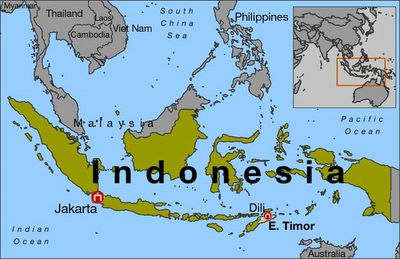
Indonesia on alert after bird flu deaths
Karima Anjani
July 22, 2005
Indonesia is preparing 44 hospitals across the archipelago for treatment and detection of bird flu after the country recorded its first deaths from the virus. Agriculture ministry experts have reported sporadic H5N1 virus outbreaks killing more than nine million fowl in 21 provinces, out of a total of 33, across the archipelago since late 2003.
Indonesian policy has favored vaccinating over culling to stop bird flu, due to lack of funds to compensate farmers.
The WHO has questioned the effectiveness of vaccines and say culling is the best weapon.
The virus has already jumped species in Indonesia and was discovered in pigs in May on densely populated Java island.
Pigs can carry human flu viruses, which can combine with avian viruses, swap genes and create virulent strains. But pig farming in the world's most populous Muslim country is not widespread. Islam regards pigs as unclean.REUTERS
Siberian bird flu alarms Russia
BBC News - UK
Bird flu has hit poultry in a Siberian village, in Russia's first case of the disease for more than 15 years. Health staff jump queue for stockpiled bird-flu vaccine
Scotsman - United Kingdom
TWO million doses of bird-flu vaccine are to be stockpiled in Britain, the government announced yesterday...
Work begins on new flu-vaccine factory in Poconos
Miami Herald - FL,USA
SWIFTWATER, Pa. - Work began Wednesday on a new $150 million factory to make flu vaccines... It is possible that at least there's been some human-to-human transmission. But it's really important that human-to-human transmission doesn't automatically mean an epidemic or pandemic.
We've had human-to-human transmission in little clusters in Vietnam, Thailand already. It's when it becomes really efficient that one person can spread it to lots of people, who then spread it to lots of people, is when the trouble really occurs, and so far this has not yet happened.
ALEXANDRA KIRK: How high do you rate the risk then, of this case?
JOHN HORVATH: I think our current risk levels, and I've been in contact with WHO recently, remain at the level it's been. No one has raised the risk levels yet. The figures people have been talking about are that there is a small but realistic chance that sometime in the next year or two we could have an epidemic or a pandemic. The figures that have been bandied around are 10 per cent.
ALEXANDRA KIRK: Do you accept those figures?
JOHN HORVATH: I think we do accept those figures. That's the sort of figures people internationally are talking about.
ALEXANDRA KIRK: How alarmed do you think Australians should be then, about Indonesia having confirmed its first human fatalities from bird flu?
JOHN HORVATH: Well, I don't think that we need to be any more alarmed than we are currently. We are working continuously to have a high level of preparedness. I don't think the fact that Indonesia is a bit physically closer than Thailand or Vietnam is an issue, as with air travel everything is close.
TONY EASTLEY: Australia's Chief Medical Officer, Professor John Horvath, speaking with Alexandra Kirk.
No comments:
Post a Comment